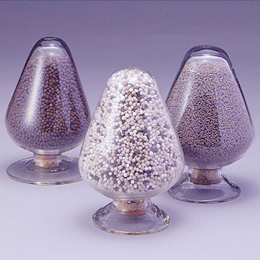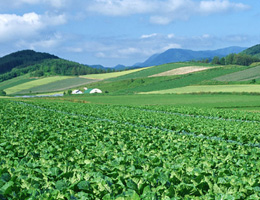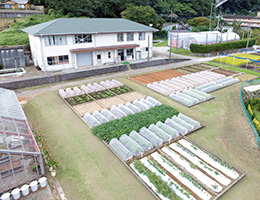

Is a vitreous fertilizer that helps the normal growth of agricultural crops.
The fritting technology that allows adding a wide variety of features by changing the raw materials in the glass is also utilized in agriculture. A unique product special to TOMATEC is the micronutrient fertilizer "F∙T∙E", produced by fritting six elements (manganese, boron, iron, zinc, copper, and molybdenum) that, though in tiny amounts, are critical for crops to grow normally.
It is used by many farms producing quality produces because in contrast to conventional, water-soluble nutrients that may drift away, F∙T∙E allows nutrients to be delivered steadily over a long period of time, and without much danger of overdose.

Did you know that glass can slowly dissolve in earth? F∙T∙E (micronutrient fertilizer) is based on this property. Though in tiny amounts, manganese, boron, iron, zinc, copper, and molybdenum are six critical elements for crops to grow healthy. By applying our glazing technology, we managed to commercialize these nutrients as a vitreous fertilizer. F∙T∙E is an environmentally friendly composite vitreous micronutrient made to slowly dissolve for absorption during the crop growing season. With F∙T∙E, crops can be grown under the best conditions for each region as we can adapt it for any soil.
• Promotional Video

To be of help to farmers, we must be sure of the effectiveness and usability of the F∙T∙E from the same viewpoint as the farmers. For this reason, TOMATEC started its own experimental farm where it tests its products to produce highly reliable products that farmers can use in peace.
• Long-term Application Test to Check the Safety of F∙T∙E
Crops are grown carefully and thoroughly over time. Long-term application test is essential for the commercialization of F∙T∙E. TOMATEC has been running tests regarding appropriate dose on the same soil for more than 20 years to check for excessive accumulation of components and alterations in soil.
•Fertilizer Effectiveness Check in Own Experimental Farm
TOMATEC not only checks the safety of its product on the soil but also their effectiveness on the growth of crops. To this end, TOMATEC grows a wide variety of crops to test all of its products.
•Basic Research on Micronutrients
To produce quality products, TOMATEC is also committed to basic research, contributing to the advancement of the entire industry by publishing the results of its research in the Japanese Society of Soil Science and Plant Nutrition.

